Over the last five years, Panama has weathered the COVID-19 pandemic, paralysing nationwide protests, and a drought that has brought transportation through its famed canal to a standstill.
But on Sunday, the slender Central American country is set for a shake-up, as its latest presidential election unfolds.
Eight candidates are vying for the position occupied by outgoing President Laurentino Cortizo, whose office is limited to a single five-year term at a time.
Foremost among the presidential hopefuls is Jose Raul Mulino, a former security minister who stepped into the race to replace embattled ex-President Ricardo Martinelli.
The former president was previously the frontrunner, until a 10-year prison sentence for money laundering rendered his campaign illegal under Panamanian law.
Mulino, Martinelli’s former running mate, now leads the race in his stead. An April poll from the research agency Gallup places him at the front of the pack, with 29 percent of the voters’ support.
Other contenders include an array of high-ranking government officials. Second in the running, for instance, is Martín Torrijos, another former president, with 14 percent of voters backing him.
Even the current vice president, José Gabriel Carrizo, is in the race, though opinion polls show him lagging with only 5 percent support. All but one of the candidates are considered conservative: Only economist Maribel Gordón, a long shot, represents the left.
Still, the race could be anyone’s to win. Gallup found that 22 percent of voters were undecided, and the presidency will be determined in a single vote, with no run-offs.
What are the issues shaping this year’s race? Al Jazeera breaks down the voters’ top concerns.
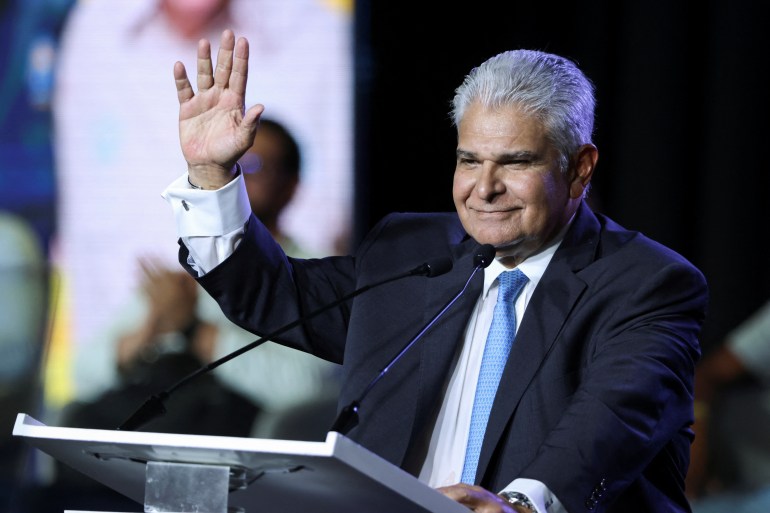 Jose Raul Mulino has emerged as the frontrunner going into Sunday’s presidential election [Aris Martinez/Reuters]
Jose Raul Mulino has emerged as the frontrunner going into Sunday’s presidential election [Aris Martinez/Reuters]Government corruption
Gallup found that corruption was the main concern driving Panamanians to the polls this election cycle, with 57 percent of respondents identifying it as the primary issue affecting the country.
The nonprofit Transparency International ranks Panama among the bottom half of all countries in its corruption index.
And in 2015, a United Nations official estimated that the country loses 1 percent of its gross domestic product (GDP) — approximately $520m — each year due to corrupt practices.
Panama’s Social Security Fund (CSS) is often singled out as an example. Last week, for instance, the Attorney General’s Office announced the arrest of three officials from the agency after an investigation surfaced evidence of bribery.
“The CSS is a financing well for corruption,” economist Felipe Argote told Al Jazeera.
“The institution is full of botellas, inefficiency and overpricing,” he added, using Panamanian slang for someone who collects paycheque without working.
But while all eight presidential candidates have pledged to stamp out corruption, some have faced suspicions of malfeasance themselves.
One candidate, lawyer and former judge Zulay Rodriguez, is currently under investigation for money laundering and misappropriating 66kg (146 pounds) of gold from a client.
Torrijos, meanwhile, has previously faced scrutiny for his ties to the Brazilian construction firm Odebrecht, which was accused of bribing officials across Latin America in exchange for beneficial contracts.
Experts say the institutional corruption in Panama has a direct bearing on the results of the election. In a 2019 report, Transparency International estimated that 23 percent of Panamanians had been offered some form of bribe in exchange for their vote.
“It’s unusual to see a person with a campaign hat or T-shirt handing out brochures in the street who hasn’t been paid,” political scientist Claire Nevache told Al Jazeera.
Part of the problem, she explained, stems from the wealth gap between Panamanians: Poverty drives some citizens to seek favours from politicians.
“Panama’s great inequality fuels great patronage,” Nevache said.
“For many people with scarce personal networks and low education levels, the only way to get a job is in the public sector. So you go and work in the campaign for a local representative or congressman with the hope that they will give you or a relative a job once they’re in charge.”
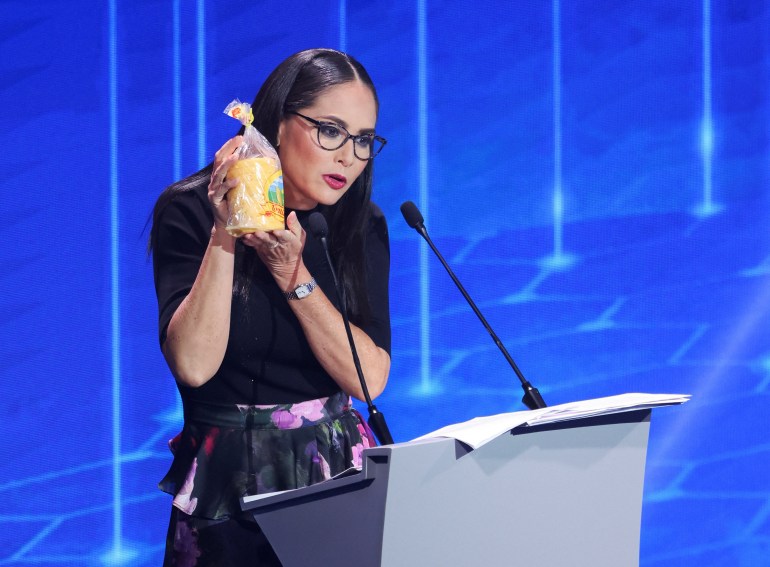 Presidential candidate Zulay Rodriguez Lu uses a bag of tortillas as a prop during a debate on April 17 [Aris Martinez/Reuters]
Presidential candidate Zulay Rodriguez Lu uses a bag of tortillas as a prop during a debate on April 17 [Aris Martinez/Reuters]Economic concerns
Despite Panama’s low inflation rate and sustained economic growth, the World Bank considers it to be the third most unequal country in Latin America, behind Brazil and Colombia.
While the economy grew at a rate of 7.3 percent last year, that growth was uneven, with 12.9 percent of Panamanians continuing to live in poverty on an income of $6.85 a day or less.
Unemployment likewise is improving, with the World Bank indicating the joblessness rate sits at 7.4 percent, down from more than 18 percent in 2020.
But the organisation noted that job quality “still shows signs of deterioration” and that the labour market “failed to improve for all demographic groups”.
“Unemployment is above 50 percent among young people,” says Ileana Corea, an economist and former student leader. “This rate is well above the general unemployment rate.”
While general unemployment has been in decline since the pandemic, almost half of the workforce does not have a contract. Workers are instead forced to take informal jobs with few protections and little stability.
That also means fewer workers are contributing to public funds through payroll deductions. Yet, critics have pointed out that the eight presidential candidates have been hesitant to address the entrenched fiscal issues Panama faces.
“None of the candidates have presented concrete proposals,” Publio Cortés, a former vice minister of finance, told Al Jazeera. “One of the accepted realities is that the state will have to chip in.”
Cortés also noted that the international agency Fitch recently downgraded Panama’s credit rating over issues like “party fragmentation” and “institutional weakness”.
The lowered credit rating is likely to increase the interest rates that the government must pay, putting a further strain on its finances.
“With a government deep in debt that has recently lost its investment grade, it will also reduce the state’s capacity to attend to other public necessities,” Cortés said.
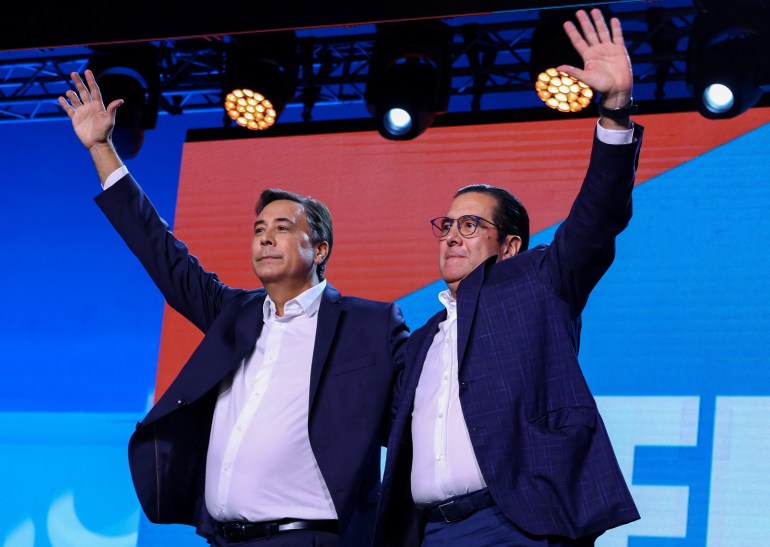 Presidential candidates Meliton Arrocha and Martin Torrijos wave during a campaign rally on April 29 [Aris Martinez/Reuters]
Presidential candidates Meliton Arrocha and Martin Torrijos wave during a campaign rally on April 29 [Aris Martinez/Reuters]Mining controversy
Fitch also cited the closure of a controversial mine in its decision to decrease Panama’s credit rating.
The site, called Cobre Panamá, was one of the world’s largest copper mines. Previously, it contributed 5 percent of Panama’s gross domestic product.
But in November, the country’s Supreme Court ruled the mine’s 20-year contract was unconstitutional. Shortly thereafter, officials ordered it closed.
“The mine is in hibernation, like it’s waiting for the new president,” said Raisa Banfield, an environmental activist and former vice mayor of the capital, Panama City.
All the presidential candidates have claimed they will uphold the Supreme Court’s ruling, though Banfield said some have shown potential conflicts of interest.
Vice President Carrizo, for instance, has admitted to serving as a lawyer for the mine’s previous owner, Petaquilla Minerals.
Another candidate, former Foreign Minister Rómulo Roux, was part of the law firm that advised the mine’s most recent owner, the Canadian group First Quantum, about acquiring the site.
“The only candidates who have talked about the closure and transformation of the site are Ricardo Lombana and Maribel Gordón,” Banfield said.
“They have explained what they want to do afterwards. But, besides that, the environmental discourse of the candidates is pretty weak.”
Activists like Banfield also warn the fight over the mine is far from over. First Quantum has already initiated proceedings to seek $20bn in reparations for the closure through international arbitration — a large sum that could dent the government’s coffers.
The company has also articulated plans to meet with Panamanian officials after the elections, in the hopes of reopening the mine.
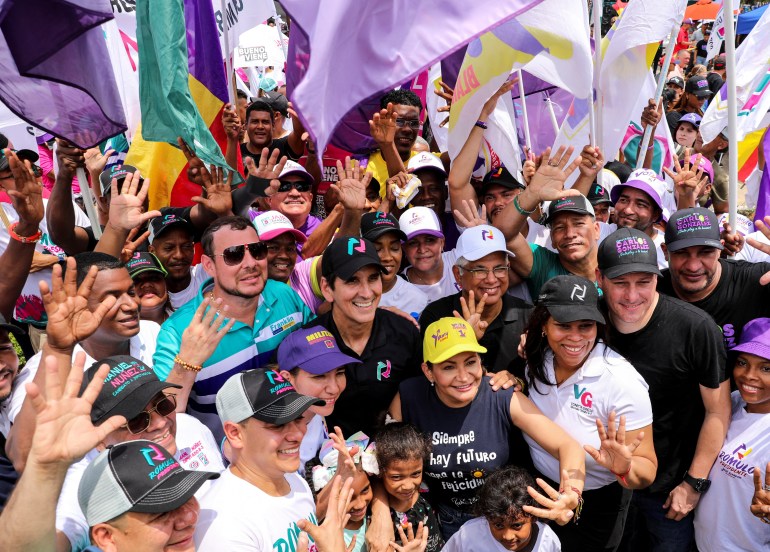 Romulo Roux stands in the centre of a crowd of supporters at his Panama City rally on April 21 [Aris Martinez/Reuters]
Romulo Roux stands in the centre of a crowd of supporters at his Panama City rally on April 21 [Aris Martinez/Reuters]Environmental questions
Hundreds of protesters have flooded the streets over the last year to show support for the closure of the Cobre Panamá mine and other environmental concerns.
Climate change has remained a prominent issue in Sunday’s elections, especially for young voters who comprise nearly half of Panama’s electorate.
Along the coast, rising sea levels have endangered Indigenous groups like the Guna, whose members have seen their island homes submerged by yearly floods.
El Niño weather patterns, meanwhile, have heightened heatwaves and contributed to an extreme, months-long drought that began in 2023.
Water scarcity has become a pressing issue in the country. According to the UN Economic Commission for Latin America and the Caribbean (CEPAL), about 5 percent of Panama’s population lacks access to basic water and sanitation services.
The drought is also causing commerce to suffer. The Panama Canal is a crucial international shipping route, allowing boats to cut across the country and travel between the Pacific and Atlantic oceans.
But the canal requires a steady water level for ships to pass through its locks and chambers. With the drought wreaking havoc on those water levels, the canal has had to cut back on its traffic.
“The drought in the canal is like when you have a restaurant and a queue outside that can’t get in because you don’t have enough tables,” Argote, the economist, told Al Jazeera.
Canal administrators have estimated that the bottleneck will cost them up to $700m in revenue losses.
“We aren’t receiving the money we could be receiving due to the water problems,” Argote said.
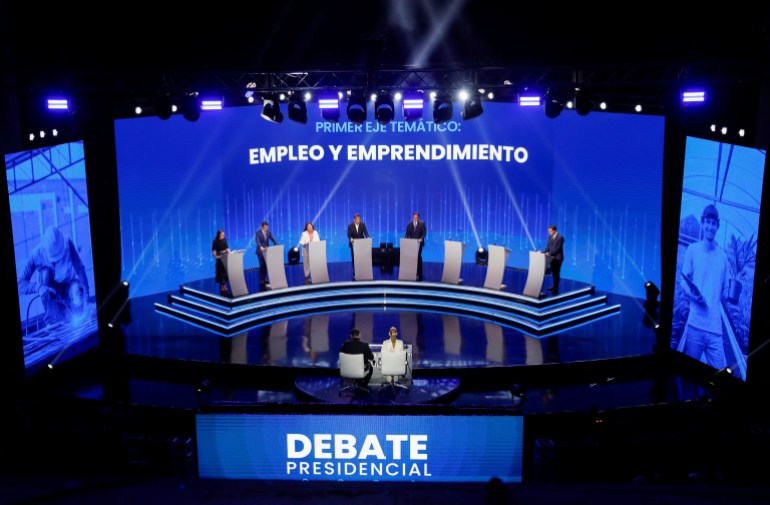 Candidates Zulay Rodriguez Lu, Romulo Roux, Maribel Gordon, Ricardo Lombana, Martin Torrijos and Meliton Arrocha prepare to debate on stage on April 17 [Aris Martinez/Reuters]
Candidates Zulay Rodriguez Lu, Romulo Roux, Maribel Gordon, Ricardo Lombana, Martin Torrijos and Meliton Arrocha prepare to debate on stage on April 17 [Aris Martinez/Reuters]Change on the horizon?
The experts who spoke to Al Jazeera, including Nevache, warn that whoever wins Sunday’s election will face an uphill battle in addressing Panama’s myriad issues.
One of the challenges will be rallying members of the National Assembly. A record number of independent candidates, 127, are running to serve in the legislature during Sunday’s election, without party allegiances to unify them once in office.
“They’re ideologically very diverse, going from left to far right,” Nevache said.
Some of the presidential candidates are also seeking to overhaul the constitution if they take power, in an effort to extinguish the country’s corruption.
Roux, for example, has pledged to call a constituent assembly within 30 days of taking office to revise the current charter, which dates to 1972.
Another candidate, Lombana, likewise said a new constitution was necessary “to change the rules that have protected the corrupt”.
However, Cortés, the former finance minister, told Al Jazeera that he doubts a new constitution will solve Panama’s array of problems.
“A new legal framework isn’t a magic elixir for excessive inequality and lack of opportunities for the young,” he said.
But he did acknowledge that constitutional reform has widespread popular support.
“Large sectors of the population believe that the biggest problems in the country can be resolved with constitutional changes,” he explained. “That’s why politicians offer it, because the people ask for it.”

 2 weeks ago
103
2 weeks ago
103

